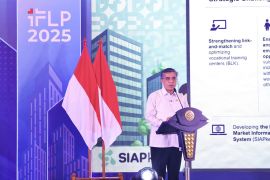The domestic economy expanded 6.02 percent in the first quarter of 2013, down from 6.11 percent a quarter earlier or lower than the central bank`s forecast of 6.2 percent, BI Governor Darmin Nasution said.Jakarta (ANTARA News) - Bank Indonesia (BI) has predicted that the national economy in the second quarter of 2013 will grow at a slower pace than projected earlier, and so will the economic growth this year.
The domestic economy expanded 6.02 percent in the first quarter of 2013, down from 6.11 percent a quarter earlier or lower than the central bank`s forecast of 6.2 percent, BI Governor Darmin Nasution told the press following a meeting of BI board of governors here on Tuesday.
The shortfall in gross domestic product was the result of declining domestic demand amidst a slow pace of export recovery, he said.
The BI governor said household consumption slowed down, along with a decline in the people`s purchasing power as a result of foodstuff price inflation and inflation expectation over uncertainty about the government`s subsidized fuel policy.
Meanwhile, the government`s consumption grew at a low pace early this year due to low spending particularly on goods. Investment particularly in non-construction sectors slowed down owing to low prospects of domestic and international demands, he said.
The central bank has predicted that the economy in the second quarter of 2013 will grow at a slower pace than its forecast and will not be much different from the first-quarter growth.
Overall, the 2013 economic growth is expected to move to the lower percentage limit of 6.2-6.6 percent.
The current account deficit in the first quarter of 2013 was recorded at 2.4 percent of the gross domestic product, down from 3.5 percent a quarter earlier.
The shortfall in the current account deficit was the result of improving balance of trade fueled by a drastic drop in the import of consumer goods, the central bank noted.
Meanwhile, capital and financial transactions in the first quarter of 2013 recorded a deficit, along with declining foreign investment inflows because of worsening global economic situation and high inflationary pressure.(*)
Editor: Heru Purwanto
Copyright © ANTARA 2013












